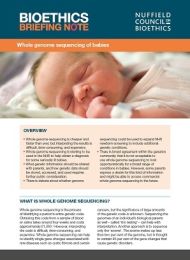Whole genome sequencing of babies
Policy Briefing
Published 27/03/2018

What is whole genome sequencing?
Whole genome sequencing is the process of identifying a person’s entire genetic code. Obtaining this code from a sample of blood or saliva takes around four weeks and costs approximately £1,000.* However, interpreting the code is difficult, time-consuming, and expensive. Whole genome sequencing can help to identify single gene changes associated with rare diseases such as cystic fibrosis and certain cancers, but the significance of large amounts of the genetic code is unknown. Sequencing the genomes of an individual’s biological parents as well – called ‘trio testing’ – can help with interpretation. Another approach is to sequence only the ‘exome’. The exome makes up less than two per cent of the genome, but is thought to contain 85 per cent of the gene changes that cause genetic disorders.
*Faster methods of whole genome sequencing are being developed but require specialist equipment and expertise, and are currently expensive. See, for example, Miller et al. (2015) A 26-hour system of highly sensitive whole genome sequencing for emergency management of genetic diseases Genome Med 7: 100.

Share